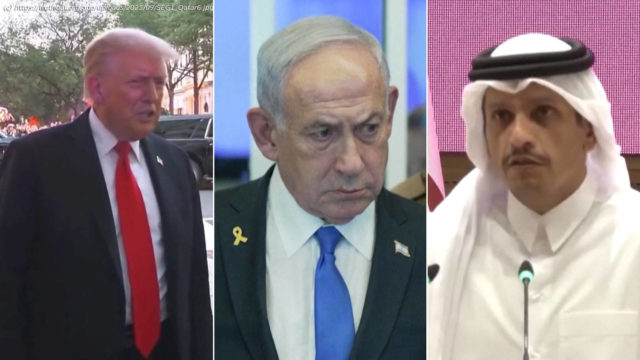“They tried to kill the very people that would have been sitting across the table in these negotiations,” says Scahill.
Global condemnation is mounting after Israel bombed Qatar’s capital Doha, attempting to take out senior Hamas leaders who had gathered to consider a U.S. proposal for a Gaza ceasefire. Hamas leadership survived the strike, which killed six. We speak with Jeremy Scahill, co-founder of Drop Site News, who has reported extensively on Gaza ceasefire negotiations and is one of the few Western journalists to be in regular contact with senior members of Hamas. He reacts to Tuesday’s unprecedented strike.
“The very Palestinians who are trying to negotiate some form of a truce with Israel, Israel then targets them and kills them,” says Scahill, who also questions claims by the Trump administration that it was uninvolved in the planning of the bombing. “At the end of the day, Americans should be asking themselves: Is all of this worth the cost, that America is bankrolling this, arming this, supporting this, encouraging this?”
AMY GOODMAN: Israel targeted senior Hamas leadership in Qatar yesterday, launching a military strike on Doha. Hamas says its top leaders there were considering a U.S. proposal for a Gaza ceasefire. Though they survived the strike, five lower-ranking members died in the attack. A Qatari security staffer was also killed.
Israeli Prime Minister Benjamin Netanyahu spoke yesterday after the attack.
AMY GOODMAN: The leaders of Jordan and the United Arab Emirates are reportedly set to arrive in Qatar today. Saudi Arabian Crown Prince Mohammed bin Salman is expected to visit tomorrow.
Meanwhile, the families of the remaining Israeli hostages held in Gaza say they fear for the fate of their loved ones. Einav Zangauker, the mother of Israeli hostage Matan, condemned Netanyahu for the attack on Qatar.
AMY GOODMAN: World leaders condemned the strike, including France, Germany, Britain, the European Union. Germany’s chancellor called Israel’s attack on Qatar “unacceptable,” adding, quote, “The war must not spread to the entire region,” unquote. China and Russia have also denounced the attack.
The White House said it warned Qatar just prior to the attack, but Qatar said it only received notice from the U.S. as the capital was being hit by Israeli strikes. On social media, Trump wrote, quote, “I view Qatar as a strong ally and friend of the U.S., and feel very badly about the location of the attack.” Trump spoke yesterday.
AMY GOODMAN: Qatari Prime Minister Sheikh Mohammed bin Abdulrahman al-Thani said yesterday Qatar’s mediation efforts were central to its identity and that the Israeli attack would not deter its diplomatic role.
AMY GOODMAN: For more, we’re joined by Jeremy Scahill, co-founder of Drop Site News. His latest piece is an exclusive, headlined “The 100-Word Ceasefire ‘Proposal’ Trump Sent Hamas.” Jeremy is a former senior reporter and correspondent at The Intercept.
Jeremy, welcome back to Democracy Now! If you can just first respond to Israel bombing Qatar, trying to take out, assassinate Hamas leadership, which apparently it did not succeed in doing?
JEREMY SCAHILL: Well, first of all, Amy, let’s remember that Qatar houses U.S. Central Command and is part of this security umbrella that Donald Trump spoke about, including recently, when he made his trip around these Gulf countries. So, the idea that the United States was just informed of this at the last minute — you know, Trump said, oh, the U.S. military informed him, and then he scrambled to try to let Qatar know, and he said, “Oh, my special envoy, Steve Witkoff, I told him to call Qatar, but, oops, he did it too late, and the bombing had already happened” — that’s not a believable narrative at all. And, in fact, what we’ve seen over the past couple of weeks is Donald Trump making very thinly veiled threats against the Hamas leadership, directly mentioning them and saying that nasty things are going to happen to them if they don’t accept his ultimatum, which essentially boiled down to a surrender agreement where Hamas was being asked to hand over all of the Israeli captives. There are roughly 20 of them believed to be still alive, and then another 30 or so who are deceased. And Trump has been saying that some nasty things are going to happen to the Hamas leadership if they don’t do this.
But I think it’s important to back up, because the context of the lead-up to this over the past year is almost never mentioned in Western media. It’s as though history begins each time the U.S. or Israel make an ultimatum, and those ultimatums are aimed at trying to blame Hamas for a continuation of this war of extermination against the Palestinians.
Last summer, in July of 2024, the United States was engaged in negotiations with Hamas. Hamas, on July 2nd, accepted a ceasefire deal. This is in 2024, the summer of 2024, that they were told that the United States had signed off on, and that if Hamas agreed to certain amendments, that Israel was going to be on board. And in the midst of those discussions, Israel assassinated Ismail Haniyeh, who was actually the last democratically elected prime minister of Palestine, not just of Gaza. And he was Hamas’s political leader and its chief negotiator, and they assassinated him.
And then nothing happened with the ceasefire, until Donald Trump was running for election, and he and Joe Biden then endorsed a ceasefire that, by all accounts, Trump sort of pushed through with Netanyahu, that went into effect in January. Israel blew up that deal on March 2nd, unilaterally exited it, imposed a full-spectrum siege on Gaza, barring any food, medicine or other life essentials from entering the Gaza Strip. On March 18th, it then resumed its genocidal campaign of terror bombings against Gaza, that have endured to this moment.
Then, a couple of months ago, Steve Witkoff, the special envoy, and Benjamin Netanyahu said that Hamas must accept what they called the Witkoff framework, which was a 13-point plan for a two-month ceasefire, during which half of the living Israeli captives would have been released, and there would have been negotiations on ending the war. It was a very difficult framework for Hamas, because it came very close to crossing some of the red lines that Hamas had defined, that it felt that if it agreed to these terms, it would effectively amount to a surrender of the Palestinian cause of liberation. But on August 18th, just over three weeks ago, Hamas formally agreed to what mediators said was 98% of the terms that had been demanded by Netanyahu and Trump. Israel did not respond to that in any formal way. Trump and Israel then escalated their threats against Hamas, after they accepted it.
And, Amy, by the way, Hamas made unprecedented concessions, concessions that include not demanding a clear timeline for the withdrawal of Israeli forces from the Philadelphi Corridor in southern Gaza. That was a huge deal for Hamas. They reduced the number of Palestinian captives held by Israel that would be released in a deal.
Start
United States
USA — Events The US Bankrolled Israel’s Attack on Qatar, Jeremy Scahill Reminds Us






